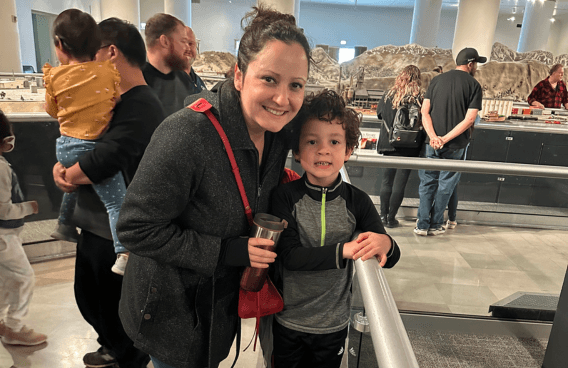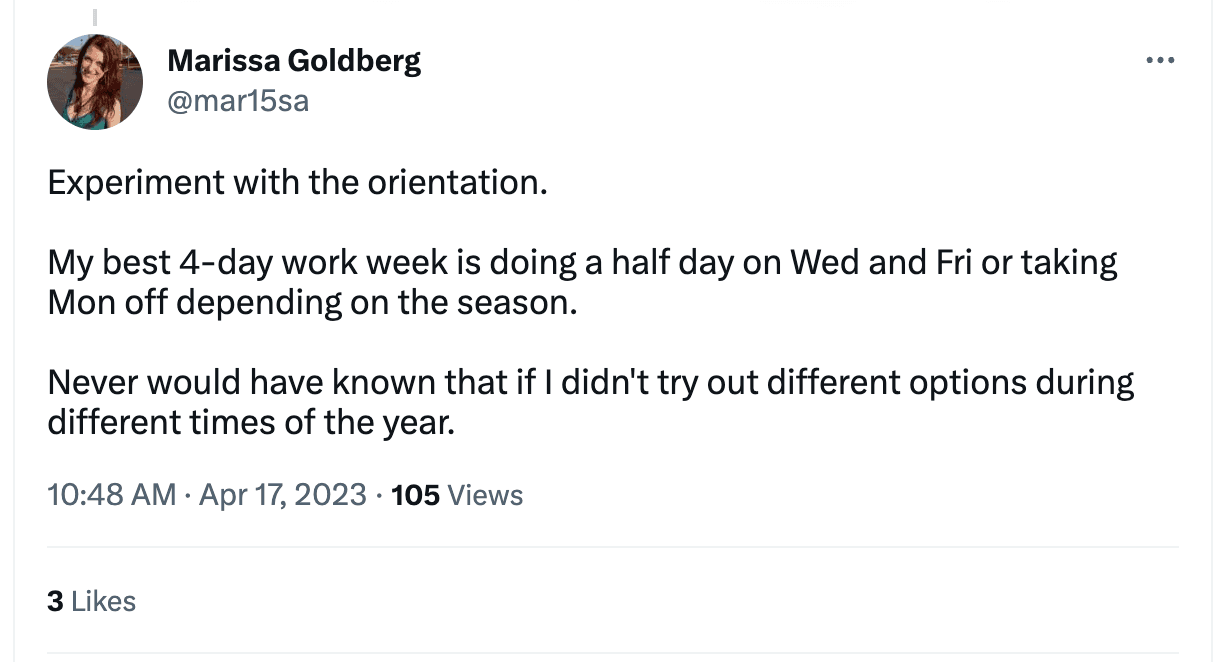365 Days of the 4-Day Workweek: Lessons and Tips for Your Team
After a year of four-day workweeks, here's what we've learned and how you can put it into practice.

Last year, we decided to launch a new company.
Like a lot of people, I’d been reading about the four-day workweek with a mix of curiosity, jealousy and wonder about what it would be like to have a magical extra day in the week every week. It seemed unfathomable given a whole career spent working traditional corporate hours.
But startups get to break things and be at the forefront of innovation, so my co founders and I decided that the research behind the four-day workweek was compelling enough to give it a shot. Now, it’s been a whole year of working four-day workweeks, so I decided to reflect and share what we’ve learned, with the hope that more people understand the implications of adopting this policy beside the obvious points around being more mindful of time management.
Policy matters
There are many different ways to adopt a four-day workweek:
- Teams may take the same day off each week whether it’s Monday, Wednesday or Friday
- Teams may work 10 hours each day for 4 days
- Employers offer reduced time for reduced pay
- A “reduced hours” approach where individuals can decide when and how to take the time away from work, with no reduction in pay.
We decided to adopt a policy that promoted flexibility: While we encourage a four-day workweek that is Monday-Thursdays and do not expect responses on Friday, we understand that some people may benefit from five shorter workdays. From my cofounder Justin Gallagher:
“It's actually been challenging for me to adjust to the four day schedule. I'm so used to the usual five day week, and so much of my life, like my kids’ school schedule, revolves around the five-day workweek. I have to really make an effort to maintain the four-day schedule (and reap the benefits) because inertia and old habits seem to always be pushing me towards a five-day week.”
This is where having a clear company policy around expectations and norms is key. Early in drafting our policy, I listened to a podcast with Adam Grant where an economist noted that caregiving responsibilities don’t follow any sort of working schedule: whether it’s caring for kids, parents, or yourself, there may be conflicts at any time.
A policy to support people as humans should emphasize outcomes over hours and be clear about what is expected for success.
Put it into practice:
- ✍️ Start by writing out what a policy might look like for your company. Why are you considering this policy? What do you hope to accomplish?
- 💪 Audit how you measure performance. How do people know what success looks like in their role at your company? Is it written down somewhere or is it implied? If there is ambiguity, consider ironing out those details before shifting the policy.
- 🧪 Experiment with different structures before making any permanent changes. Treating the change as an experiment first will help people understand that

The same output is possible
Studies have shown that people don’t work anywhere near 100% of the time. In fact, some research suggests that in traditional working environments, only 3 hours of work is done in an eight hour workday. So, what’s the point of milling around unproductively?
Part of the opportunity with adopting a four-day workweek is to look at what superfluous meetings or idle time can be smoothed away by policy or cut to make way for the work that matters. Here’s what founding engineer Travis Fischer had to say:
“I was initially very suspicious of my ability to get the most important work done in 80% of the time. I thought that there is a need for a certain amount of human messiness and lower focus ebbs and flows every day and it would be ineffective to compress that into 80% of the time.
However, I've found that I'm pretty consistently able to accomplish the most important work in the shorter work week and that the time constraint does have a very focusing effect. The time constraint is a real factor in producing focus and efficiency.”
Companies that follow a four-day workweek long term see no hit to revenue or growth. In fact, they see a huge benefit in employees being happier and sticking around longer, improving efficiency and lowering turnover.
Put it into practice:
- ❌ Cancel most if not all recurring meetings. Consider adding meetings as part of a toolkit of communication instead of the only tool.
- ⚖️ Communicate that each person is in charge of their time. Give people agency over their own calendars.
- 🕜 Consider adopting asynchronous tools and practices
Self awareness and planning are key
As a busy working mom, the extra time has been absolutely life changing. Having a buffer day to shift all errands, doctor’s appointments, etc. has been a boon to my mental health. My cofounder Justin also points out the benefit to focused work that comes from decreasing the mental load:
“Having non-weekend time, like a Friday, to schedule personal to-dos and appointments makes a big difference for maintaining focus on important work stuff during the other four days.”
As I’m used to planning ahead, I have to plan carefully with my time at work, keeping others’ requests and timing at the forefront of my own planning. The last thing I want to do is be a bottleneck for others.
Because of the reduced time, I’ve leaned into learning what works best for my own energy levels and productivity. I’m a person who is extra creative in the morning, so I try to block that time for creative work (like writing this post!) and when energy levels are lower in the afternoon, I schedule meetings. Of course this isn’t always possible, but being clear and communicative with my team helps.
Put it into practice:
- 🪫 Once you have control of your calendar, consider running an “energy audit” to see what activities to prioritize at different times
- ❓As requests for collaboration come in, clarify their timing and importance so you can prioritize effectively.
- 📆 Consider blocking time off on your calendar to do work so you stay on top of your priorities vs letting others dictate what you do.
The benefit of an extra day
One of the most amazing benefits to work from having a day free of pings, distractions, and sitting in front of a computer is the ability to think. Some of the most successful people like Bill Gates, Barack Obama and Warren Buffett have famously blocked off long chunks of time to read and think.
"I take a lot of time to read and think about things. And I think that's pretty common for successful entrepreneurs. I believe that reading is the key to success in whatever you do. I try to read at least one book a week, and I make sure to take time to think about what I've learned from each book." - Bill Gates.
In our current environment of notifications, meetings and distractions this kind of focus time can feel like a luxury, but the 4-day workweek provides space to prioritize. I’ve found that it’s hard to turn off my brain the days when I’m not “working,” and some of my most creative insights have come from listening to podcasts, reading unrelated books, or just taking a walk. Research supports this insight.
Put it into practice:
- 😀 Step away and enjoy the time away. Studies show that to get the total benefit of time off, you need to disconnect.
- 🥹 Free yourself from the guilt of trying to do everything all at once and embrace the spontaneity of of deep and creative thought to drive insights
- 😉 Accept that others may have different preferences and schedules, that’s ok too.
It’s not all roses and sunshine
One area of learning for our team has been how not to lose momentum in a compressed workweek. We are a startup, and startups thrive on speed and momentum. What we have learned so far is that there are better ways to work where we don’t need to think about a workweek as having a traditional frenzied Monday morning beginning and a lazy Friday afternoon ending.
Another learning is the importance of communicating deadlines and expectations upfront. We strive to work mostly asynchronously so people can create their own schedules around when they’re most productive, and this style of working takes an extra beat to communicate expectations without expecting real time responses.
For example, we’ve learned to move forward on launching without consensus because not everyone can chime in on everything all the time. Creating a constraint around a deadline for giving feedback helps move work forward and away from consensus culture.
Put it into practice:
- 📅 Over communicate deadlines.
- 🗣️ When asking for feedback, make sure to specify what type of feedback you expect
- 🤔 Consider how much input from others is actually needed to move forward.
Would I go back to a traditional schedule?
One of the biggest takeaways from working a four-day workweek is the freedom from traditional constraints. Once you have a taste of that freedom and what it can unleash to bring about a happier existence, it’s tough to consider going back to an arbitrary schedule tied to a system created for a factory environment during the Industrial Revolution. We’re no longer using horse drawn carriages, so why should our work be tied to standards from a past era?
Stop wasting time on repetitive responses
No setup, no training. Just better support, automatically.